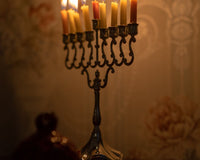Olive wood, a hard, rich, durable, and beautiful wood that is sought after throughout the world, is produced from olive trees in Europe and eastern Africa, mainly in the countries on the southern and eastern coasts of the Mediterranean, including Israel and Palestine, the Holy Land.
Olive trees originated in the Asia Minor countries, but have since spread throughout Europe and northeastern Africa, thanks to their low maintenance and longevity. The olive tree bears fruit with a unique and appealing flavor that can be enjoyed on its own or turned into the incredibly popular olive oil. Plus, olive wood is extremely strong and has a fine uniform texture that works well for many different applications. The grain of east African olive wood has been referred to as "straight-grain" because the olive lumber pieces can be perfectly aligned, making it ideal for constructing high-end furniture, kitchenware, wood carvings, and so on.
However, olive wood, despite its durability and strength, is highly vulnerable to elements and insect attacks. As a result, it's most often seen in indoor furniture and smaller wooden decorative items. It is not utilized in the mass production of flooring, paneling, or building materials because it has a shorter lifespan and weaker resistance to weather.
Olive wood has a spectacularly beautiful and colorful appearance, making it the perfect material for decorative objects. Easily identifiable, olive wood has distinctively dark brown lines and yellowish-brown streaks and can be polished to a high shine. When olive wood is cut, it releases an aroma of freshness and sweetness into the air. This scent is particularly appealing and pleasant and can remain on a piece made with olive wood for many years to come!
What Are the Different Types of Olive Trees?
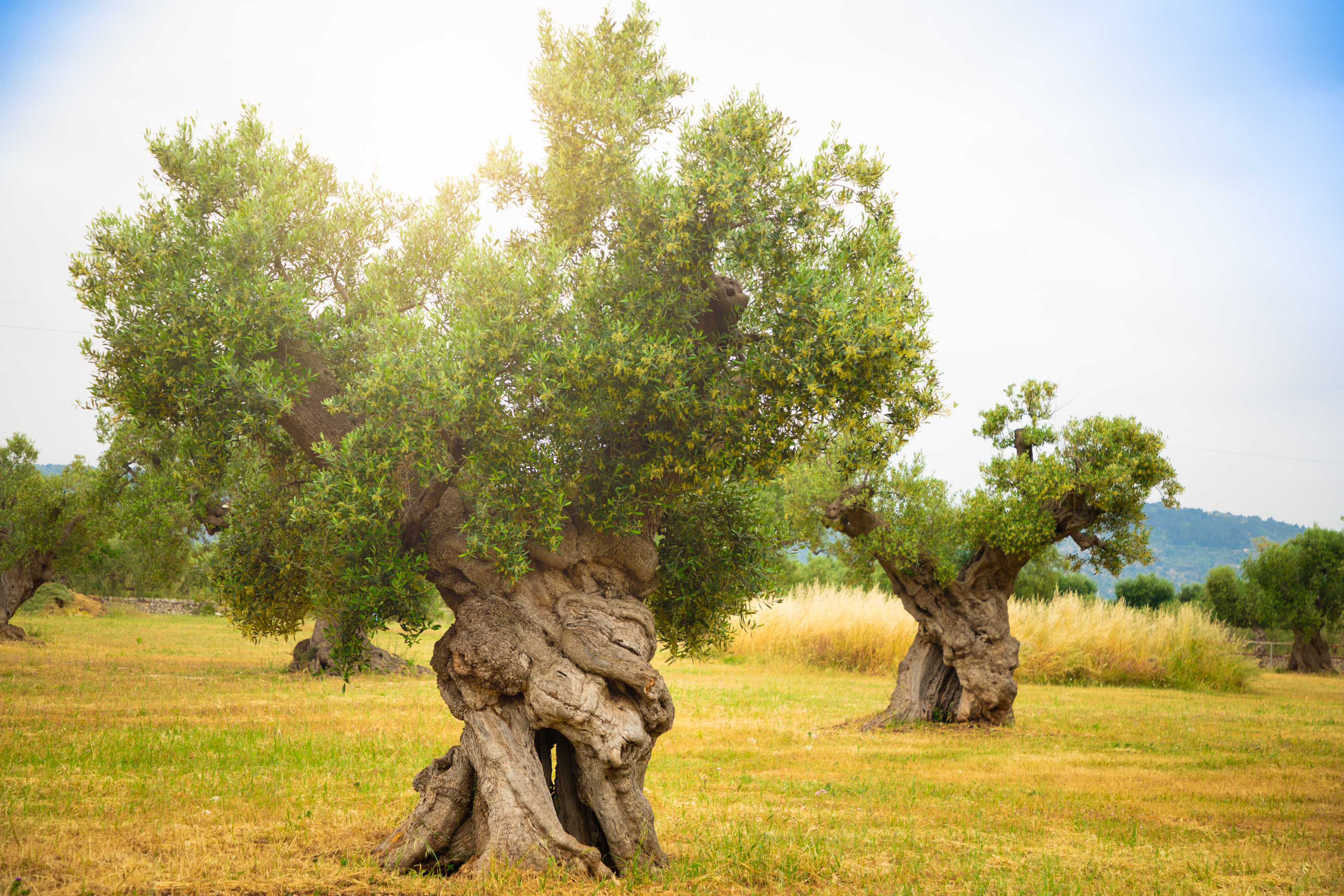
Olea Europaea
The olive tree originated in the eastern Mediterranean, Syria, parts of Asia Minor, the Southern Caspian Sea, and northern Iran. The gnarled trunk growth, attractive shape, and distinctive appearance make the olive tree one of the most easily recognized plants in the world. The Olea europaea is most well-known for its adaptable wood and exquisite olive fruit, which may be refined into rich olive oil, a staple of traditional cuisine in the tree's native countries. Its leaves are also utilized in traditional herbal therapy, particularly in the Mediterranean area, to prevent and cure numerous ailments. The boughs of an Olea europaea are recognized as a sign of peace.
Olea Capensis
Also known as the black ironwood, Olea capensis is a species of African tree in the olive family Oleaceae. The black ironwood is a bushy shrub that is usually around 30 feet tall, although some bigger trees reaching 130 feet in height have been documented.
This tree is frequently taken from the wild for its high-quality wood. It also contains edible fruits and it is useful for some therapeutic applications. Olea capensis is native to Africa, from northern and eastern Africa, including Somalia, Ethiopia, and Sudan, to South Africa, Cameroon, Sierra Leone, and so on.
History of Olive Trees
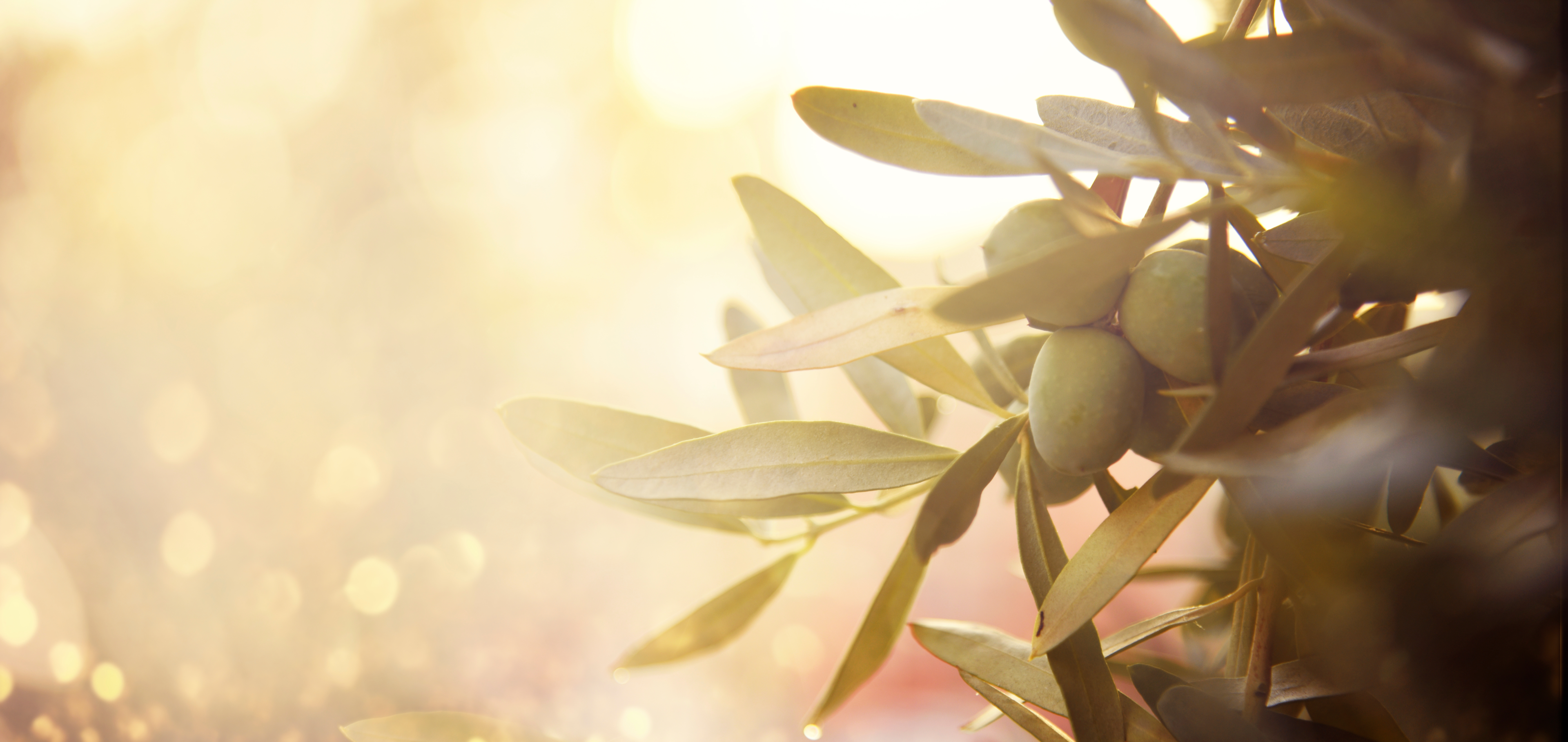
Olive trees have been grown for centuries and continue to be a major influence on the culture and traditions of many different people. Olive trees grow with very little maintenance or care and are among the oldest known cultivated plants in the world. The oldest certified olive tree was recorded over 6,000 years ago.
The long history demonstrates how important this tree has been for humans since time immemorial – this dense wood was being cultivated on Crete as early as 3,000 BC and used to make oil throughout ancient Greek civilization. It was the Greek that gave us the word “elaion", which evolved into "oil". The Phoenicians spread the olive tree to the shores of Africa and Southern Europe. Olives have been found in Egyptian tombs more than 2,000 years old and were known to be eaten raw by pharaohs.
Symbolism of the Olive Wood
The olive tree has a strong presence in the Jewish Torah and Christian Bible. For example, the dove is attributed to having returned from a mission to find dry ground with an olive branch in its beak after the worldwide flood in the days of Noah. Jesus himself had several historically significant times around an olive tree, which is a reminder of its blessedness. Jesus prayed near an olive tree in Gethsemane, near Jerusalem, after the Last Supper in Matthew 26:36. Jesus sought spiritual comfort near this tree while he waited for the hour of his crucifixion, while his disciples slept nearby. The actual tree where Jesus prayed still exists today, according to legend, and attracts thousands of visitors each year.
The olive tree also has a much deeper spiritual significance in the Bible, particularly when we consider Zechariah's revelation in Zechariah chapter 4. The prophet sees two olive trees on either side of a solid gold lampstand, which provides the oil that runs the lamps. Zerubbabel and Joshua, the governor and high priest, are symbolized by the two olive trees. The olive tree oil was the carrier for a combination of spices that formed the holy anointing oil, and it is thus representative of the Holy Spirit's anointing in this revelation.
The depiction of holy witnesses as two olive trees in Revelations 11:4 is another illustration of the olive tree's significance. The olive tree's reputation as a unique kind of tree has been bolstered throughout history by these examples in biblical narratives. It subsequently became one of the most highly regarded and valuable trees known to Jews and Christians.
Traditionally, olive oil, made from the fruits of the olive tree, has been used to anoint followers, priests, prophets, and kings in religious rituals, and is also said to be a beneficial component of one's diet.
Benefits of Olive Wood
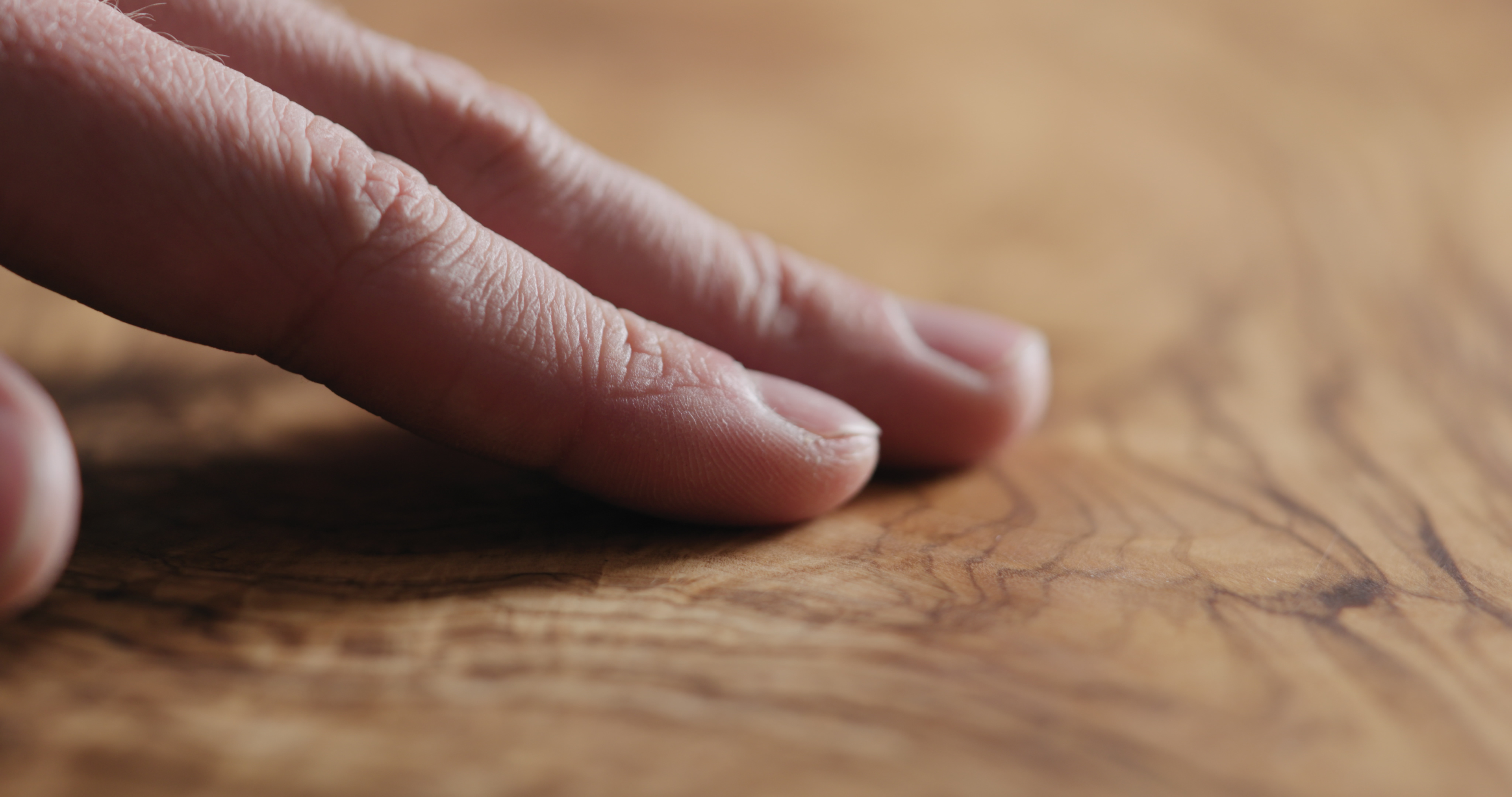
Olive wood is a colorful hardwood that is used for many purposes, including decorative items and kitchenware. Olive wood's sustainable qualities make it a favorite for indoor products that last longer than most others; plus you get the bonus of an environmentally friendly by-product! Here are a few more reasons to appreciate olive wood:
It Is Easy to Carve
Olive wood is employed in carving because it can be carved precisely with simple hand tools. It displays an excellent balance of form and color. Wood from an olive tree is long-lasting, able to withstand both decay, and has various resurfacing methods.
Olive wood carvings have a long and illustrious history, and they are commonly given as presents of peace and love, especially during the holidays. Olive wood crosses, crucifixes, and statues are great options for decorations and gifts.
It Has An Beautiful Visual Appeal
The visual appeal of olive wood is stunning. The rich and colorful appearance makes it perfect for use in decorative objects, while its structural features contrasting brown lines with yellow streaks give the surface an even more premium feel that you can't find anywhere else!
Olive wood is very durable and has a high resistance to both heat and water, making it an ideal material for use in the kitchen. Its unique, interlocked grain patterns make olive wood a popular choice for carvings and other forms of artwork.
If you're looking for a truly unique and beautiful wood with a moderate natural luster for your next project, olive wood is the right choice! You can also find gorgeous olive wood pieces already handmade by artisans at Holy Land Market.
The Most Dependable Option for Strong Furniture
Olive wood is not only beautiful and rich in color, but it’s also three times as hard as oak. This makes olive wood an excellent choice for fine furniture makers who want their work to last! Olive wood is great to work with thanks to its ease of turning and carving. Although olive wood is one of the hardest woods, it is simple to hand-carve it using tools or work with machines. It's effortless to construct and can be simply bonded and finished, which is ideal.
In addition, olive wood is naturally resistant to termites, so you won’t have to worry about your furniture becoming infested over time. This makes it the perfect investment for anyone looking for high-quality, long-lasting furniture.
Easily Accessible
Olive wood is easily accessible because it's not on any list of threatened species. As a result, we can infer that this species' population is still healthy and there is no indication of significant population reduction, predation, or endangerment. Even though the fruit's economic importance makes it more difficult to get, olive wood is easy to find.
Uses of Olive Wood
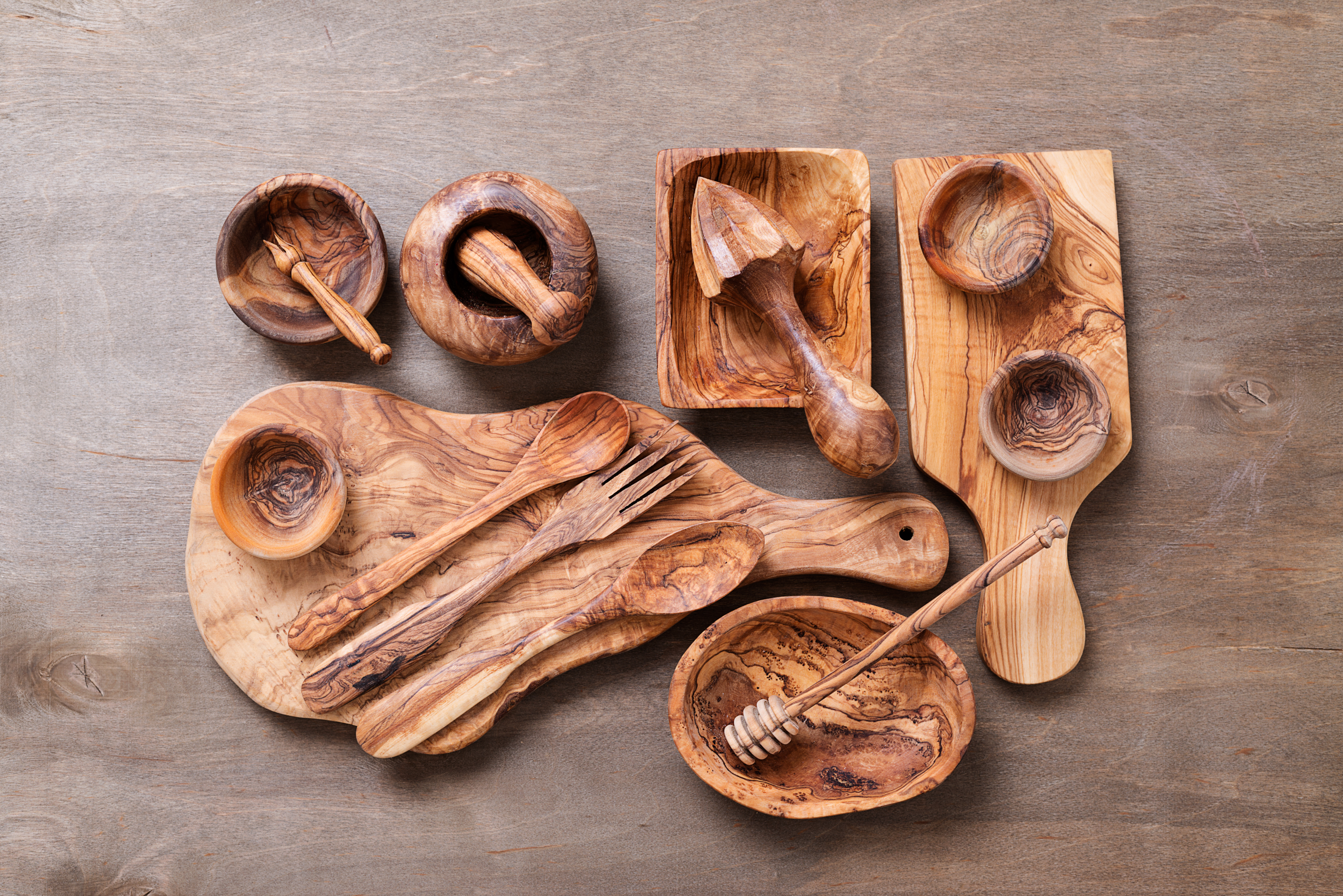
Olive wood, though hard and strong in comparison to other woods, is not used for outdoor applications since it cannot survive long periods outside. However, olive wood can stand some harsh treatment and is great in the kitchen. It is a hard and heavy wood that has been used since ancient times to make spoons and other utensils, bowls, plates, boxes, carving boards, and more.
Today, olive wood is used for kitchenware, small carvings, beads, decorations, and other specialty wood items.
How to Maintain Olive Wood Kitchen Utensils
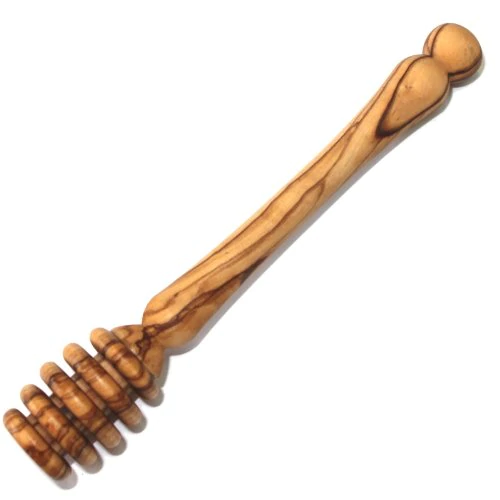
Olive wood kitchenware is typically quite strong and highly resistant to external assaults. The household items require regular upkeep to preserve them in good working order. Here are three tips to keep your olive wood kitchenware in excellent condition:
Wash
The greatest approach to cleaning your olive wood kitchenware is to wash them by hand rather than placing them in the dishwasher. The high temperature of the dishwater might harm your utensils, which are delicate and susceptible to breakage. You should wash them by hand with warm water and mild detergent/liquid wash. Afterward, rinse with lukewarm water.
Dry
After washing, immediately remove the olive wood kitchen utensil from the water to dry. If any water droplets happen to remain on the item, make sure to wipe them off with a cloth or napkin. Place your olive wood kitchen utensil in a well-ventilated area until it has completely dried out.
Oil
If you want to keep your olive wood utensils in pristine condition, be sure not to use just any type of oil on them. It can damage the natural beauty and integrity that makes an olive wood item such a valuable piece.
Instead, apply either olive oil or mineral oils from the top to bottom, then let it sit for a few minutes before removing excess liquid by wiping it away with a paper towel. Store after cleaning away all traces – just like how we store our other treasures: carefully and meticulously!
What Holy Land Market Has to Offer You
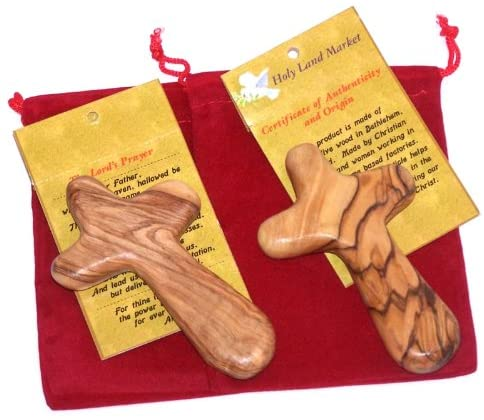
Olive wood has several characteristics that make it ideal for creating fantastic products for the home. At Holy Land Market, we go to great lengths to provide you with the best relics and religious items constructed of this unique and special wood! Holy Land Market is the perfect place to find unique products made from olive wood, such as crosses, nativity sets, and kitchenware.
You'll discover incredible things like our Jerusalem Cross olive wood rosary with organza, a small olive wood comfort cross, an olive wood keepsake with crucifix, an olive wood Silent Night nativity, and more amazing items made of olive wood. We also offer the highest quality pieces at the best prices. Here's what you can anticipate from each item you buy from us:
Originality
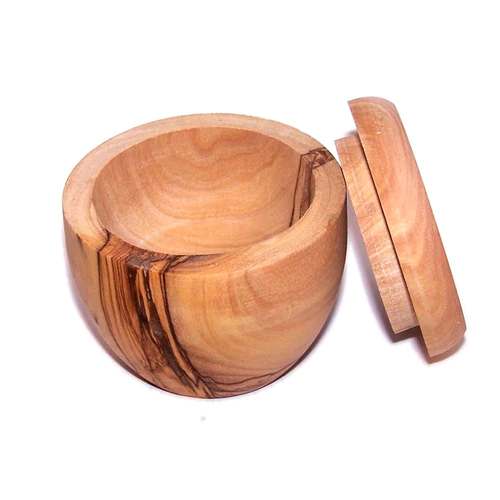
The rich wood creates one-of-a-kind creations that are unlike anything you've ever seen. If you are looking for a unique gift that will be treasured forever, look no further than these extraordinary pieces made only by skilled artists in Israel using old traditions passed down through generations.
Holy Land Market strives to offer you the widest range of gorgeous pieces of art and kitchenware that you can treasure forever with a wide variety of goods straight from the Holy Land.
Natural Elegance
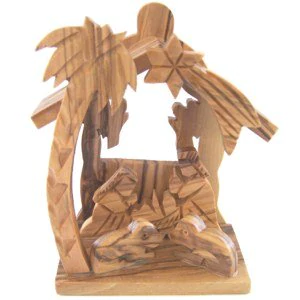
Olive wood provides a gorgeous hue range that complements the superb workmanship of each piece. At the Holy Land Market, each item you purchase exudes elegance and beauty that will last a lifetime.
The olive wood used in the construction of our products is carefully chosen for its beautiful grain and durable strength. Our artisans use only the finest tools to fashion each piece into a work of art. After the carving is finished, each item is sanded and polished, then coated with olive wax to give it a natural sheen and prevent the wood from drying out.
Holy Land Market is a one-stop shop for all your religious and cultural gift-giving needs. We offer a wide variety of items for every occasion, from birthdays to bar mitzvahs. Our selection is sure to please. Learn more about Holy Land Market's services and find out amazing olive wood items for multiple uses.



